Thomas Herman Ridgley
b. October 30th, 1925 in Shrewesbury (Louisiana)
d. August 11th, 1999 in New Orleans (Louisiana)
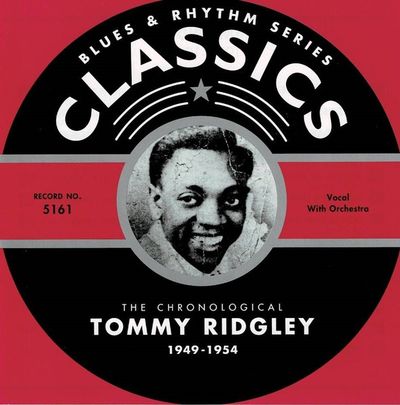
THE CHRONOLOGICAL TOMMY RIDGLEY
Classics
November 1949 - August 1954
Né à Shrewsbury, Tommy est le plus vieux de 17 frères et soeurs. Enfant, il chante à l'église puis apprend le piano. Il participe à la seconde guerre mondiale et obtient une bourse d'aide pour avoir servi sous les drapeaux, ce qui lui permet de faire des études à la Grunewald School of Music. Après avoir remporté un concours musical, il devient le chanteur régulier du club Dew Drop Inn. Il est repéré par Dave Bartholomew qui l'embauche dans son orchestre et qui lui permet de graver ses premiers et excellents morceaux pour Imperial dès novembre 1949 dans un style entre Jump Blues et Rhythm & Blues : "Shrewsbury blues", "Early dawn boogie", "Lonely man blues", "Lavinia", "Good times", "Looped", "Monkey man". Pour ceux-ci, Tommy est accompagné de remarquables musiciens comme Dave Bartholomew, Alvin "Red" Tyler, Earl Palmer, Salvador Doucette. Puis, en 1953, il quitte Imperial et rejoint Atlantic. Pour cette firme, il n'enregistre qu'une poignée de titres en 1953 et 1954 (seulement quatre d'entre eux verront la lumière du jour) dont "Ooh lawdy my baby" (avec le jeune Ray Charles au piano), "Wish I had never".
Born in Shrewsbury, Tommy is the oldest of 17 siblings. As a child, he sang in church then learned the piano. He participated in the Second World War and obtained a scholarship for having served under the flags, which allowed him to study at the Grunewald School of Music. After winning a music contest, he becomes the regular singer of the Dew Drop Inn club. He was spotted by Dave Bartholomew who hired him in his orchestra and who allowed him to record his first excellent tracks for Imperial since november 1949 in a style between Jump Blues and Rhythm & Blues : "Shrewsbury blues", "Early dawn boogie", "Lonely man blues", "Lavinia", "Good times", "Looped", "Monkey man". For these, Tommy is accompanied by remarkable musicians like Dave Bartholomew, Alvin "Red" Tyler, Earl Palmer, Salvador Doucette. Then, in 1953, he left Imperial and joined Atlantic. For this firm, he records only a handful of titles in 1953 and 1954 (only four of them will see the light of day) including "Ooh lawdy my baby" (with the young Ray Charles on piano), "Wish I had never".
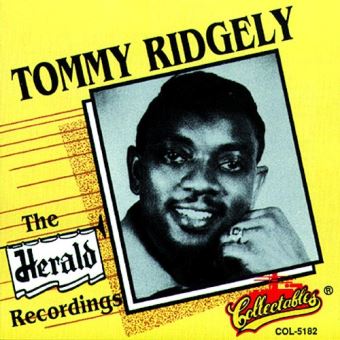
THE HERALD RECORDINGS
Collectables
1957 - 1959
Après la courte collaboration avec Atlantic, Tommy enregistre pour le label Herald, cette fois à la tête de sa propre formation (avec les saxophonistes Lee Allen, Alvin "Red" Tyler). Il continue dans son style Rhythm & Blues dansant et dynamique avec "What'cha gonna do", "Woncha gone", "Alone but not lonely", "Mairzy doats and dozy doats", "Real gone jam", "I've got my eyes on you".
After a short collaboration with Atlantic, Tommy records for the Herald label, this time leading his own band (with saxophonists Lee Allen, Alvin “Red” Tyler). He continues in his dynamic, danceable Rhythm & Blues style with “What'cha gonna do”, “Woncha gone”, “Alone but not lonely”, “Mairzy doats and dozy doats”, “Real gone jam”, "I've got my eyes on you".
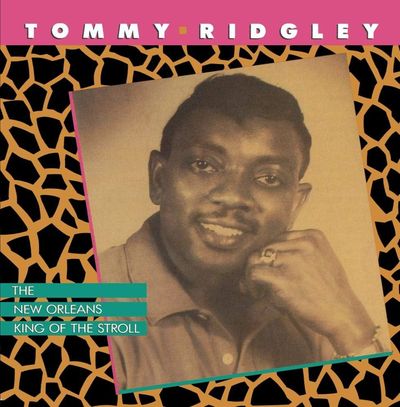
THE NEW ORLEANS KING OF THE STROLL
Rounder
1960 - January 1964
En 1960, Tommy travaille pour les labels Ric et Ron dirigés par Joe Ruffino. Il poursuit les enregistrements à un rythme régulier et rencontre encore plusieurs succès avec de percutants morceaux comme "Double eyed whammy", "Should I ever love again", "My ordinary girl", "The girl from Kooka Monga", "Please hurry home". Quand Ruffino meurt en 1962, ses derniers titres seront produits par le jeune Mac Rebennack (alias Dr John).
In 1960, Tommy was working for the Ric and Ron labels run by Joe Ruffino. He continued to record at a steady pace and scored a number of further hits, including tracks such as “Double eyed whammy”, “Should I ever love again”, “My ordinary girl”, “The girl from Kooka Monga”, “Please hurry home”. When Ruffino died in 1962, his last were produced by the young Mac Rebennack (aka Dr John).
[no image]
THEN AND NOW
? (only on cassette)
1988
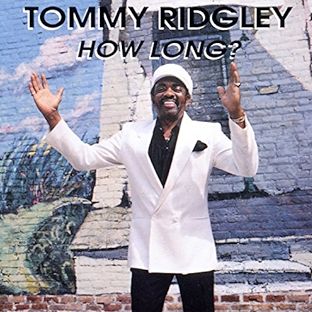
HOW LONG
Sounds of New Orleans
1990 - 1991
[no image]
WWOZ ON CD : HOW LONG
Friends of WWOZ
Early 1990's
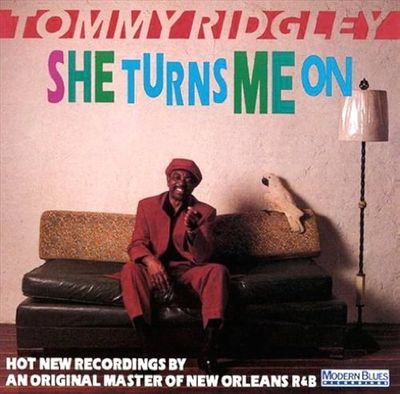
SHE TURNS ME ON
Modern Blues
April 1992
Avec le producteur Daniel Jacoubovitch et de superbes sidemen (Reggie Hall, Ronn Chopin, Jerry Jumonville, Porgy Jones), Tommy Ridgley revient aux affaires avec cet excellent album. Il retrouve le son de son Rhythm & Blues néo-orléanais mâtiné de Blues. Dans ce programme intense, on apprécie, en particulier, les accrocheurs "For you my love", "Sick and tired", "I want some money", "Stacked deck", "Jam up", "She turns me on".
With producer Daniel Jacoubovitch and superb sidemen (Reggie Hall, Ronn Chopin, Jerry Jumonville, Porgy Jones), Tommy Ridgley is back in business with this excellent album. He's back to the sound of his New Orleans Rhythm & Blues with a hint of Blues. In this intense program, we particularly appreciate the catchy “For you my love”, “Sick and tired”, "I want some money", "Stacked deck", "Jam up", "She turns me on".
[no image]
LET'S STEAL AWAY AND KISS TOMORROW GOODBYE
DuBat (only on cassette)
1992
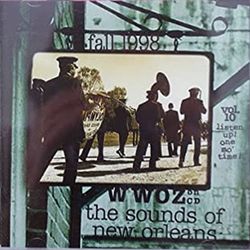
WWOZ ON CD : LISTEN UP ! ONE MO' TIME
Friends of WWOZ
April 1994
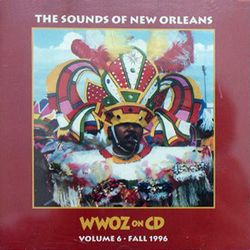
WWOZ ON CD : STEAMY NIGHT SHOWCASE
Friends of WWOZ
April 1994
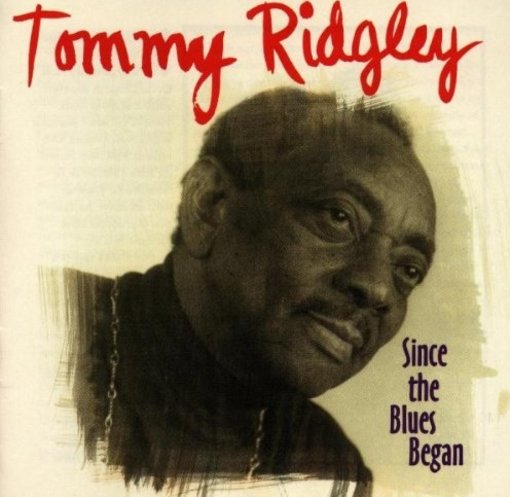
SINCE THE BLUES BEGAN
Black Top
December 1994 - February 1995
Avec la fine fleur des musiciens de La Nouvelle Orléans (Snooks Eaglin, Sammy Berfect, David Torkanowsky, George Porter Jr, Mark "Kaz" Kazanoff), Tommy propose une nouvelle fois une beau cocktail entre Rhythm & Blues, Funk et Blues. "Pretty lady", "How long", "Since the blues began", "Heartbreak", "Shack up with me", "In the same old way" figurent parmi les meilleurs moments de cet excellent opus.
With the best musicians from New Orleans (Snooks Eaglin, Sammy Berfect, David Torkanowsky, George Porter Jr, Mark “Kaz” Kazanoff), Tommy once again offers a fine cocktail between Rhythm & Blues, Funk and Blues. "Pretty lady", "How long", "Since the blues began", "Heartbreak", "Shack up with me", "In the same old way" are among the highlights of this excellent opus.
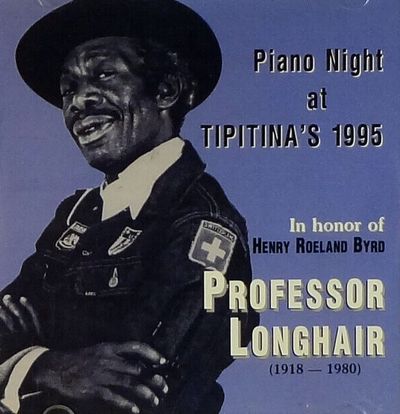
PIANO NIGHT AT TIPITINA'S
Overture
May 1995